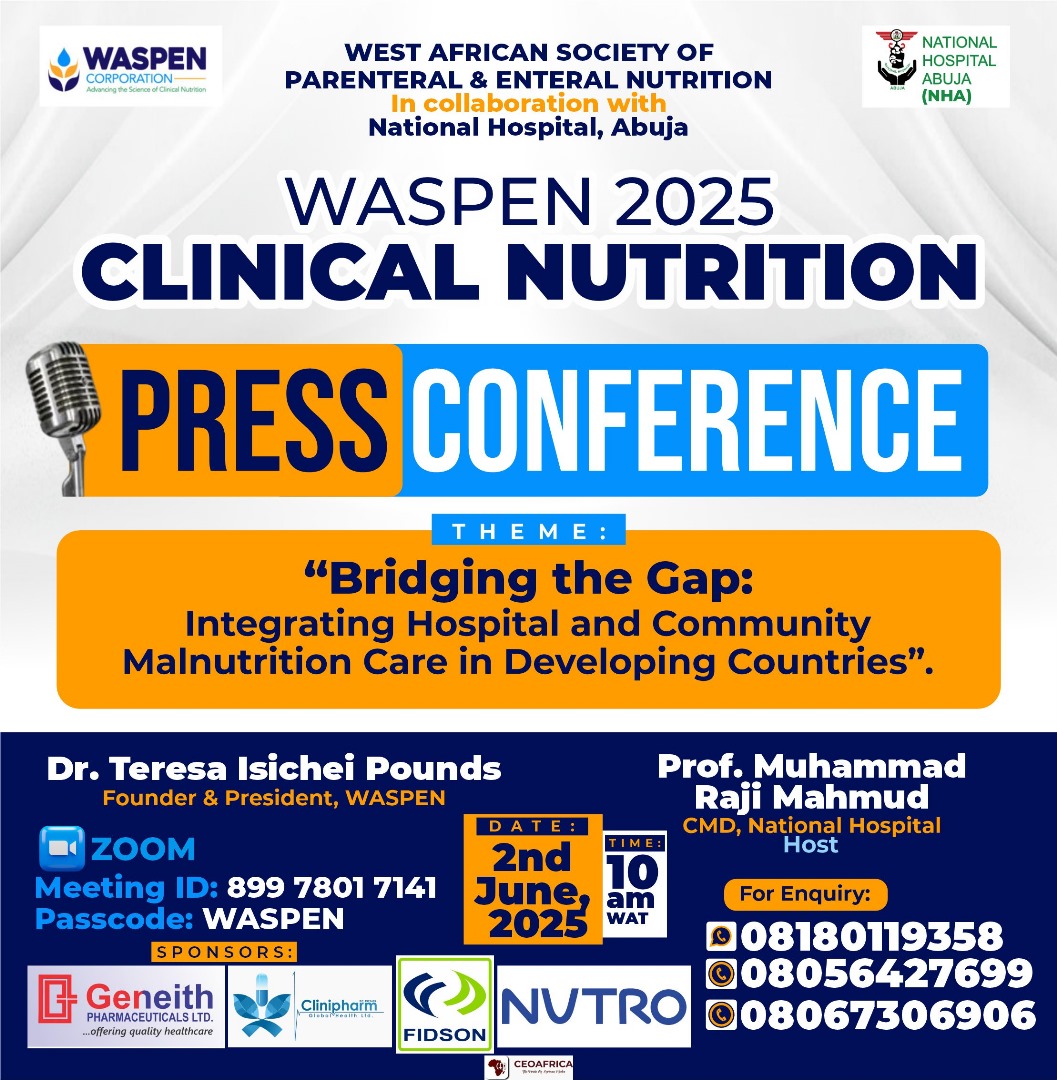In a quiet crisis unfolding within Nigeria’s hospitals, malnutrition among in-patients continues to undermine recovery and increase mortality — yet it remains largely invisible in public health conversations. Now, a new partnership between the National Hospital Abuja and the West African Society of Parenteral and Enteral Nutrition (WASPEN) is drawing national attention to this neglected epidemic, calling for immediate systemic reform.
At a joint media briefing ahead of the upcoming 2025 Clinical Nutrition Conference, both institutions unveiled a coordinated plan to integrate nutrition into mainstream hospital care, urging the Federal Government to establish a multidisciplinary task force dedicated to combating hospital-based malnutrition.
“We can no longer treat nutrition as an afterthought in clinical care,” said Mrs. Theresa Pound, President of WASPEN. “Many patients are admitted in fragile nutritional states and leave even worse. Without structured screening and intervention, we are allowing a silent epidemic to persist.”
The conference, themed “Bridging the Gap: Integrating Hospital and Community Malnutrition Care in Developing Countries”, is scheduled for June 17–19 in Abuja and will bring together medical professionals, academics, and policymakers from across Nigeria and West Africa.
Mrs. Pound emphasized that WASPEN’s goal is to support hospitals with tools for early detection, training, and evidence-based interventions to address malnutrition not only during hospitalization, but also after discharge.
A National Problem with Local Consequences
Representing the Chief Medical Director of the National Hospital Abuja, Dr. Lawal acknowledged that hospital-based malnutrition is a pervasive issue, particularly in tertiary facilities that serve patients from underserved and rural regions.
“We receive patients in advanced states of malnutrition from states as far as Sokoto, Kebbi, and Katsina,” he said. “Many are children or post-surgical cases, arriving with severe nutritional deficits that complicate treatment.”
According to him, the hospital currently employs a multidisciplinary approach involving dietitians, doctors, nurses, and physiotherapists — but more support and coordination are needed to scale such efforts across the country.
“This partnership with WASPEN gives us a framework to improve outcomes and extend our reach into primary care,” Dr. Lawal noted. “We’re now building systems to intervene earlier and ensure patients receive continuity of nutritional care after discharge.”
Call for Government Action
One of the most significant outcomes expected from the conference is a policy recommendation for the Federal Ministry of Health to establish a national technical task force on clinical nutrition. This body, Mrs. Pound explained, would develop guidelines, coordinate training, and support institutions in setting up Nutrition Support Teams (NSTs) — as already piloted in teaching hospitals like LUTH.
“This is about policy and sustainability,” she said. “We need the government to formally recognize the problem and lead the solution. No hospital should operate without a plan for nutrition care.”
Beyond the Hospital Walls
Both WASPEN and the National Hospital Abuja emphasized the need for community follow-up to prevent relapse in malnourished patients. The hospital’s Department of Paediatrics has already begun outreach to local health centers to provide early nutritional screening and referral support.
“This is where hospital care meets public health,” Dr. Lawal said. “We want to build a national model that connects the hospital to the community — ensuring that patients are supported throughout their recovery journey.”
While official data on hospital malnutrition prevalence at National Hospital Abuja is still being compiled, the institutions confirmed that statistics will be unveiled during the conference to guide evidence-based policy and advocacy.
Raising the Alarm — and Hope
As Nigeria continues to battle widespread food insecurity and a fragile health system, stakeholders believe tackling in-hospital malnutrition is not only a clinical priority but a national responsibility.
“Malnutrition doesn’t just kill — it delays healing, prolongs hospital stays, and drives up healthcare costs,” Mrs. Pound warned. “But with government support and institutional cooperation, we can reverse this trend and give patients a real chance at recovery.”
The conference is expected to set a new benchmark for nutrition integration in West Africa’s healthcare systems, positioning Nigeria as a regional leader in hospital-based nutrition care.












Leave a Reply